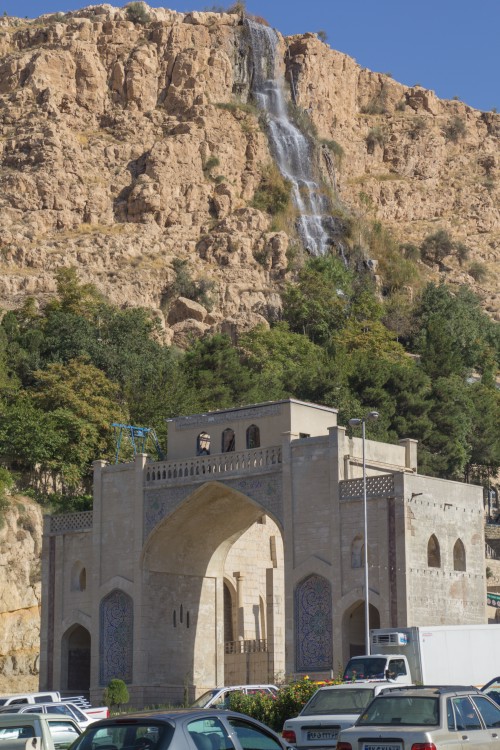
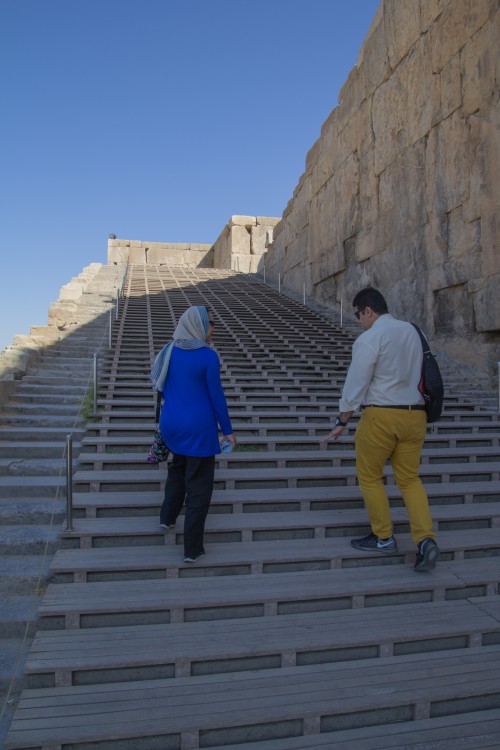
We woke up at 3:30 in the morning, so we got pretty much a full night's sleep, but just adjusted way too early. We were hoping to make it at least to 5, with the goal of having everything "normal" in another day or two. We tried to get back to sleep, but to no avail. So instead we each listened to some of the podcasts we had downloaded the night before. We also checked our email, and found out that 45 had instituted a new ban on Iranians trying to enter the US; we hoped that wouldn't cause us too much grief for the upcoming week. Certain sites (such as BBC) were blocked, as were Facebook and Twitter (but not Instagram, interestingly), but Crystal has VPN software on her computer, and so the Internet thought we were in Turkey instead of Iran, so she was able to check up on social media. Meanwhile, Justin "hacked" a Facebook post by posting to Instagram and having Instagram post the same thing to Facebook. Crystal confirmed that this worked. Of course, Justin couldn't see what people were stating in response, but whatever.
Around 7 we finally got up for good, and got cleaned up and ready for breakfast. It was the same as the day before, nothing to write home about. So instead of enjoying breakfast, we reminesced about some of the better breakfasts over the years. A couple immediately jumped to mind, Kuala Lumpur, Amman, and Palau. After breakfast we grabbed our stuff, and then went back down to the lobby a little before 8. Amin came down just before 8, and we were on our way. We made a short stop at the nearby Quran Gate to get some pictures, which was difficult because of all the traffic in the area. On the other side of the highway from the Quran Gate was an area with a lot of tents. Amin mentioned that people could camp for free in that area, if they didn't want to stay in a hotel. We asked if it was safe, and Amin laughed. Apparently Iran is very safe for violent crime.
 |
 |
By contrast, it is (or at least was) not safe at all on the roads, so now there are many more police monitoring the roads than before. One year a few years back there were six figure death toll - that's something like 3000 people a day. This is why even though Persepolis (our stop for today) is on the way to Isfahan, we'd be returning to Shiraz tonight, rather than heading to Isfahan from Persepolis and getting in around 7 or 8pm. We asked if there were any Shiraz grapes still around (even if not being turned to wine any more), and Amin indicated there were, but more towards the Persian Gulf. We really enjoy Shiraz wine, so it would have been nice to see some of the grapes in Shiraz, but it wasn't all that surprising that there aren't many vines left. Today, the fields we saw were full of other crops, including maize.
 |
There was a big Ferris Wheel where we got off the main road, in Marvdasht. We drove through town for about 10-15 minutes. On the drive, Amin mentioned a gathering in 1970s hosted by the Shah in Persepolis, where $65M was spent on the party. The event went off great and was well-received, but when word got out, lots of angry people in Iran, as they didn't even have drinkable water. As it turned out, the big party played a large role in the Revolution a few years later. After the Revolution, one of first things completed was getting safe drinking water for everyone across country. Just after exiting Marvdasht, we made a right turn, headed down side road with wide shoulders. At its end was the parking lot for Persepolis.
There were initially not very many people, but 1) we arrived early in the morning, and 2) it was still low season, as apparently in a month there will be 20x as many people. We knew generally that it was an ancient ruin, built in BC times, but that was about it. What we found out is that Persepolis was the capital of the Achaemenid empire around 2500 years ago. The english name Persepolis is derived from Greek, where the Greek name meant "the city of the Persians." The Achaemenids had a huge empire, led by leaders such as Cyrus the Great, Darius I, and Xerxes I. It was one of the first, if not the first, empire to use a beaureaucratic centralized government. [Thank you?] At its largest, the empire stretched from Greece to Central Asia, including much of the Middle East as well as Turkey and Egypt. Xerxes led the Persians in their sacking of Athens. This led to Greeks - and eventually Alexander the Great - wanting revenge on the Achaemenids, which Alexander eventually got. He sacked Persepolis and it burned to the ground at that time (although it is unclear if it was purposeful or an accident from drunken celebratory revelry). If we'd done more research prior to traveling here, we would have known why the old capital of this massive empire would be so grand. As it was, it all came as a major surprise to us.
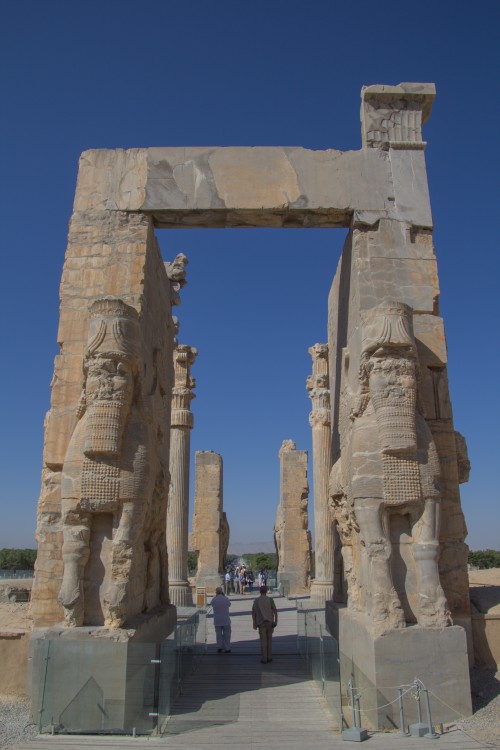 |
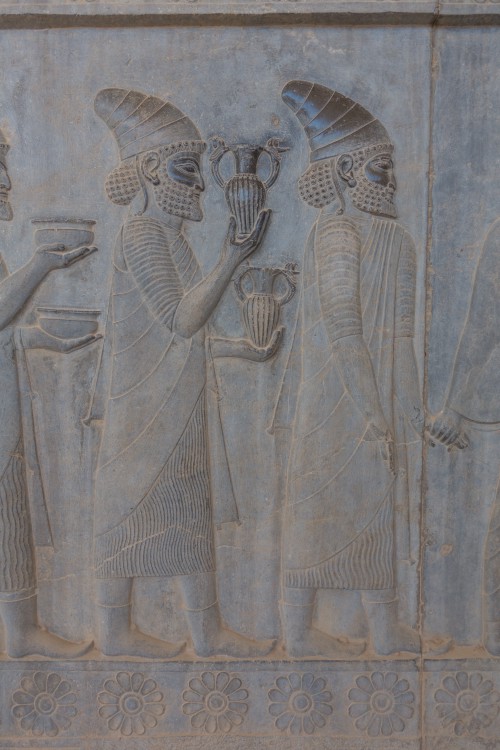 |
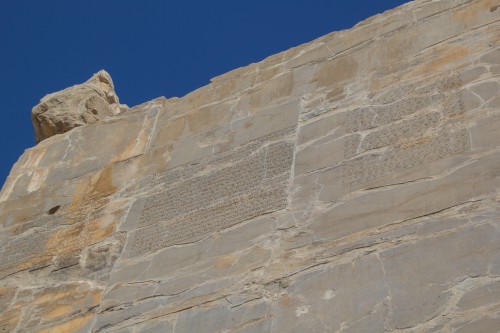 |
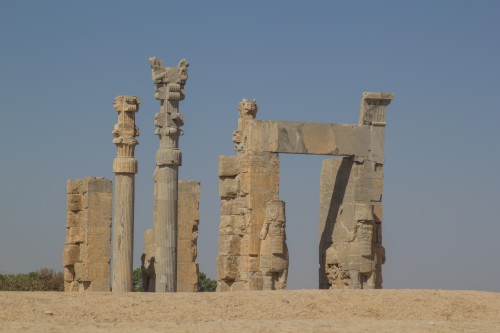 |
Persepolis was very impressive, not only in terms of scale but also detail. Regarding scale, at the front there is a huge platform, as Persepolis was built into the side of a hill. Some of the rocks that constitute the platform were enormous, on par with what we saw from the Incas around Cusco. To get up the platform, there were twin stairwells with dozens of short stairs. The short stairs were supposedly so that leaders visiting the city would not find it difficult to make it up the stairs, no matterr their age of physical well-being. The entry gates at the top of the stairs were huge, and there were inscriptions in three different languages indicating that Xerxes had commissioned them. The huge stones fit together neatly, and there was no mortar - just a tight fit.
 |
Regarding detail, because it was covered in rubble and sand for so long, large portions (particularly in the Apadana) of the city had not been exposed to elements for 2300 years, still clear as day. This included detailed ornate bas reliefs. The pictures below depict the following groups bringing the following items when they came to Persepolis to visit the Persian kings:
 |
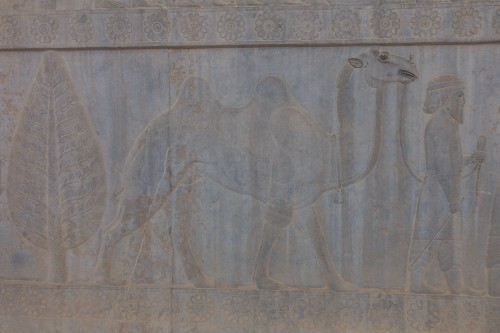 |
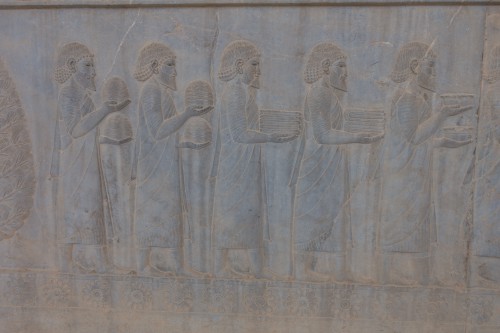 |
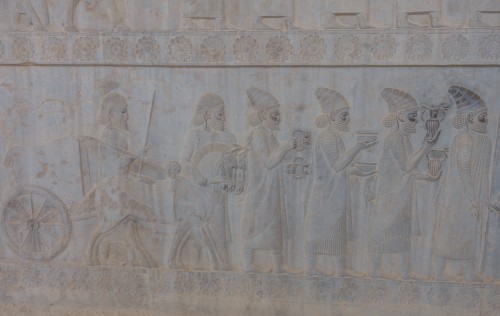 |
There were also reliefs showing groups from all over Central Asia, the Middle East, and Northern Africa, such as the Ethiopians, Libyans, Drangianians (from the present day Iran/Afghanistan area), Arabians, Skudrians (from present day Bulgaria), Sagartians (from present day southeastern Iran), Sogdians (from present day Uzbekistan), Indians, Parthians (from Iran), Gandarians (from present day Afghanistan), Egyptians, Eastern Scythians (from present day Kazakhstan), Arachosians (from present day southern Afghanistan), Sogdians (from present day Tajikistan/Uzbekistan), Cappadocians, Aryans (from present day Turkmenistan), Babylonians (from present day Iraq), Susians (from present day southwest Iran), and Medes (from present day northern Iran).
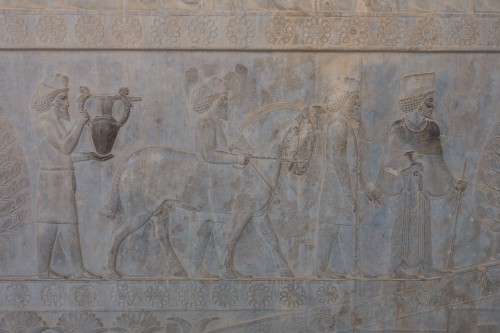 |
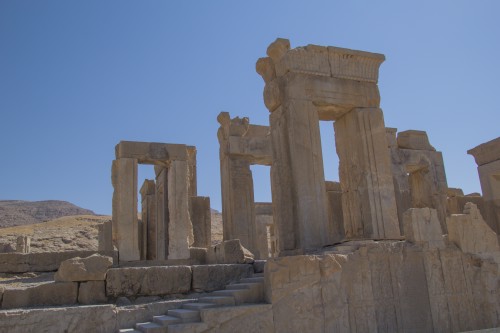 |
A decade or so ago, people could walk around almost anywhere at Persepolis. Now it is roped off in multiple places, to prevent people from touching too much. It was interesting to see what was shiny from touching over the years - eyes of animals, a wine jug, one person's hat. One large area (Tachara) was totally roped off, because of an idiot diplomat from South Korea a decade ago. He decided to steal some artifacts, and then pleaded diplomatic immunity when he got caught. So we got to enjoy the area from afar. Also enjoying the view was a giant lizard perched on top of one of the walls. We took a short break when we got to the on-site museum, where we split with Amin for a bit. At the museum, our eyes were completely shot - Justin because he forgot his sunglasses, Crystal because the sunglasses didn't matter with how dry it was and how bright it was. We walked around the muesum for 10-15 minutes, which wasn't that memorable except for a Chinese lady walking around the museum with a long selfie stick, taking video of her looking at everything in the museum.
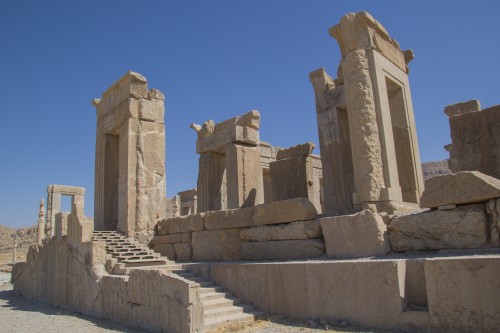 |
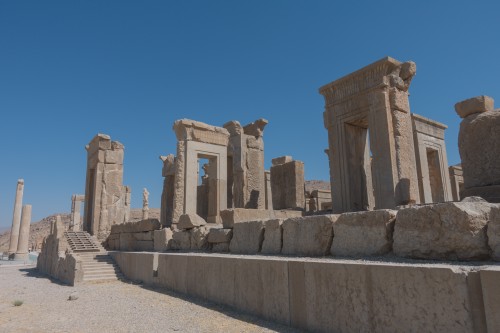 |
 |
 |
 |
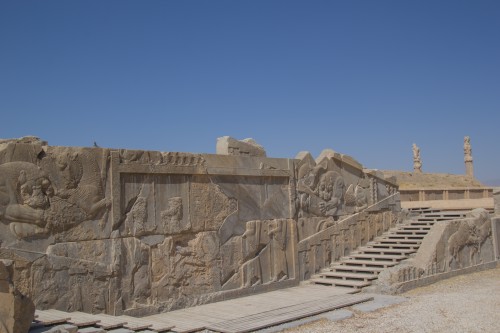 |
After exiting the museum, Crystal waited in the shade whilst Justin went up to the top where some tombs were. The tombs were of Artaxerxes II and Artaxerxes III, who ruled closer to the time of Alexander the Great (about 200 years after Persopolis was built). The tombs themselves were not that interesting, at least comparatively to everything else at Persepolis. But the view back towards Persepolis was quite nice. Several people were up at the tombs taking pictures, and Justin overheard a conversation about VPN software choices while staying in Iran. Justin headed back down to meet up with Crystal, and then we headed down, back towards the entrance. About halfway back, Justin became nauseous out of nowhere, and had to stop twice and walk very slowly from there to the exit. Thankfully he made it back to the front without incident. Once we were in the car, he was just fine. We have no clue what happened, but were happy it was just temporary.
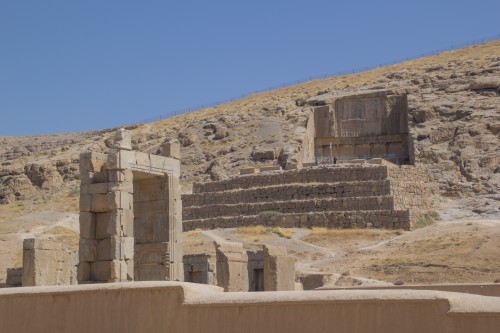 |
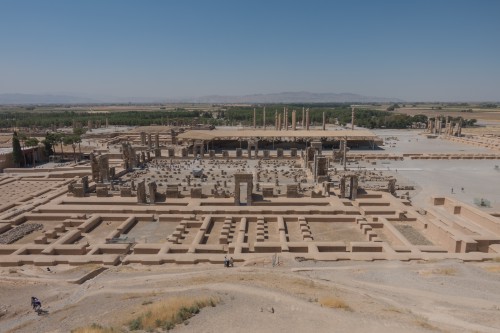 |
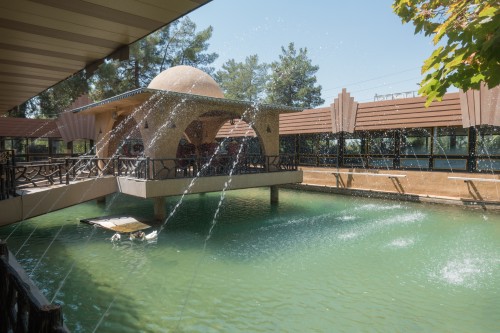 |
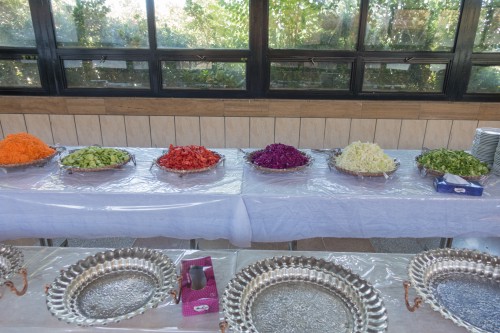 |
We drove north out of Persepolis, and had lunch at Laneh Tavros. The restaurant used to be mostly for truckers, but the food was really good, so they got a loan from one of the travel companies to expand and open up for tourists. Now almost all groups going to Persepolis stop here. We were a bit early for lunch (just before noon), and we got a VIP table in a cabana in the middle of a pool area, with fountains and ducks all around. Given the timing, they were still setting up some of the buffet. Whilst waiting for the main courses to show up, we got soup and salad first, and also got an Iranian Beer. In case you're wondering, Iranian beer is non-alcoholic. So it has all of the taste of beer, but none of the effects. How anyone, anywhere, thought that non-alcoholic beer is a good idea is beyond us. We went back for mains - veal, beef kobideh (sp), grilled chicken, rice with cabbage and small meat chunks, plus Eggplant stew, Split pea stew, and herb stew. We grabbed tea right after lunch at a shop right next to the restaurant, and had a nice chat with Amin.
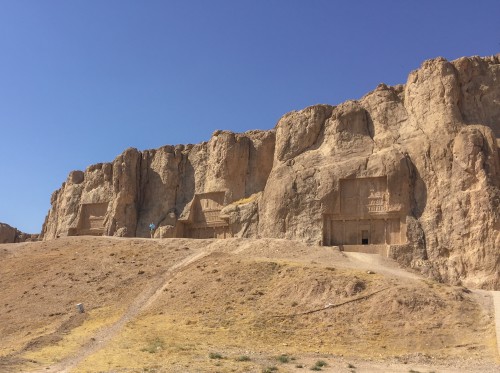 |
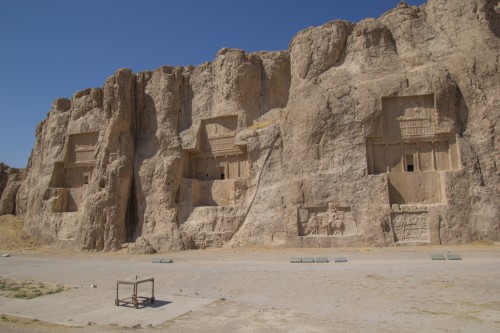 |
 |
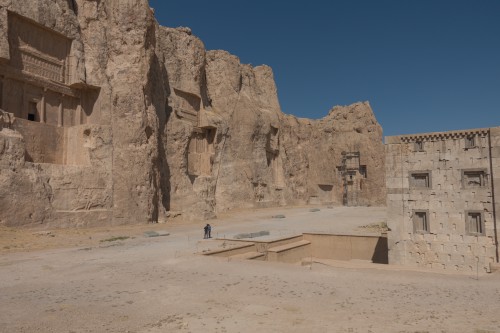 |
By the time we left, there were plenty of tour buses at the restaurant. We got back in the car and headed to Naqsh-e Rustam. It was very random, as we were driving on highway with corn fields on each side, then we came upon huge 2500 year old tombs carved into side of mountain. The tombs were completed during the time of Persepolis (about 8 miles away), before Alexander the Great (known as Alexander of Macedonia in Iran) sacked Persepolis. The tombs looked vaguely reminescent of several we saw in Petra. There are four tombs, which are believed to belong to Darius I, Xerxes I, Artaxerxes I, and Darius II. In addition to the tombs from Achaemenid times, there were also some bas reliefs added several hundred years later (i.e., the 3rd Century AD) by Sassanids. There were some nomads going behind ropes and up onto bas reliefs - this added some context to how big the bas reliefs and the tombs are. It was just these nomads and the two of us and Amin at the site; everyone else visited this area before going to lunch.
Amin indicated that no one really knew about the Naqsh-e Rustam site until 75 years ago. The local people avoided, since they thought they might get cursed for visiting. So it was only when foreign visitors showed up in the 20th Century that anyone took note. Interestingly, foreign archaelogists in 20th century basically took whatever they wanted, just splitting gold and silver 50/50 with the local governors, who got a 50% share for doing no work and just looking the other way when antiquities were taken from the area. Apparently, there is lots of old Persian antiquities in the Louvre in Paris. We'll have to check it out one of these days.
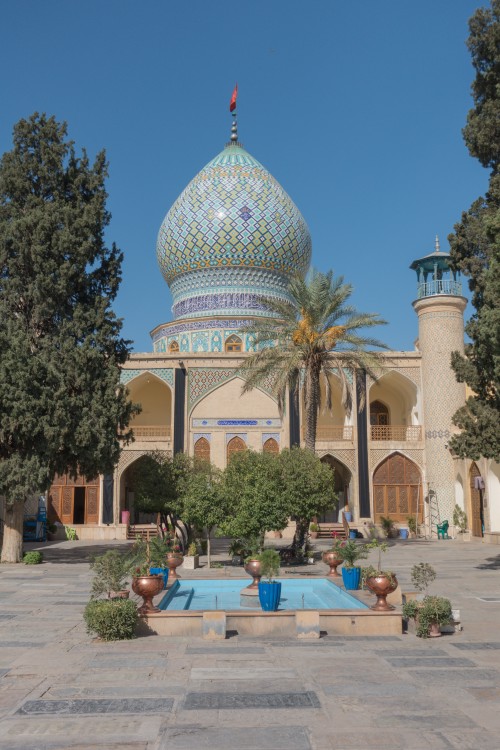 |
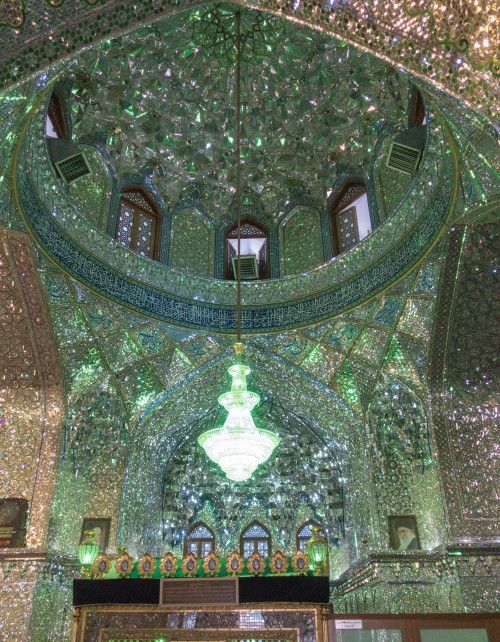 |
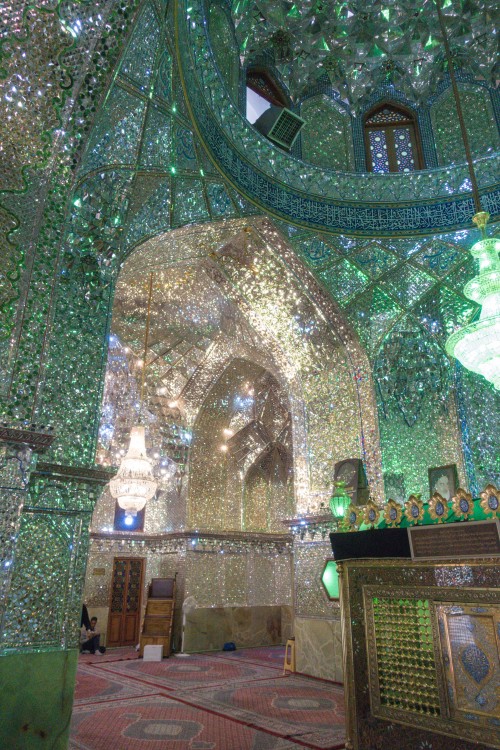 |
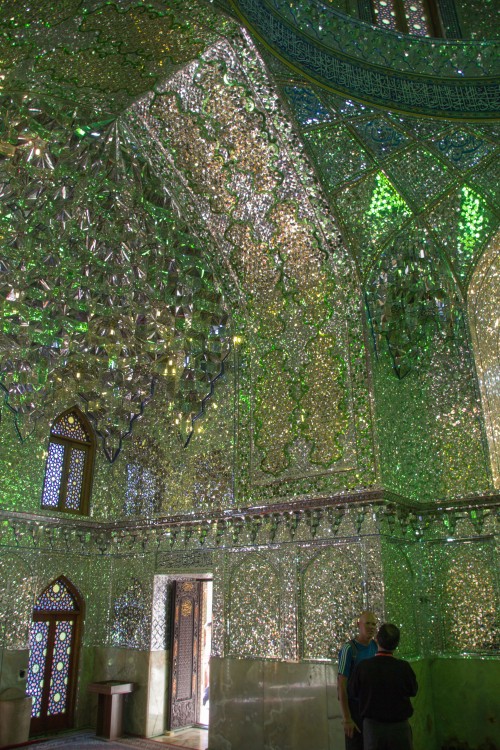 |
After meandering around for a bit, we got back in car and headed back to Shiraz. In Shiraz, Crystal headed back to hotel, since she was hot and wanted to take off her head scarf. Justin wanted to see the Ali Ibn Hamzeh shrine again, since the visit was cut short yesterday because of mid-day prayer call. Today, he took a bunch of photos, then had a very long talk with an Imam, Amin, and a tourist from Netherlands. The Imam asked if Justin had questions; he didn't, but then winged it and went from there. It was kind of like showing up at a deposition where minimal prep has been done. To begin with, religious scholars have 12 years for school, usually starting around age 20. Then, for those trying to be Ayatollahs, there is a second phase that takes an additional 20 years. The Imam mentioned that the Quran is very long, and stories and teachings are not encapsulated in a single place, so one of the issues with ISIS and others is that they find single passage and exploit it, even if that passage might be contextualized or outright refuted elsewhere. This happens a lot in the legal field as well, where one snippet from a case may seem to support a position someone is taking, even if the case as a whole goes the other way, or later cases provide context to the snippet. The Imam stated that it might take 30 years of detailed study to have a fully nuanced view of things as it relates to the Quran.
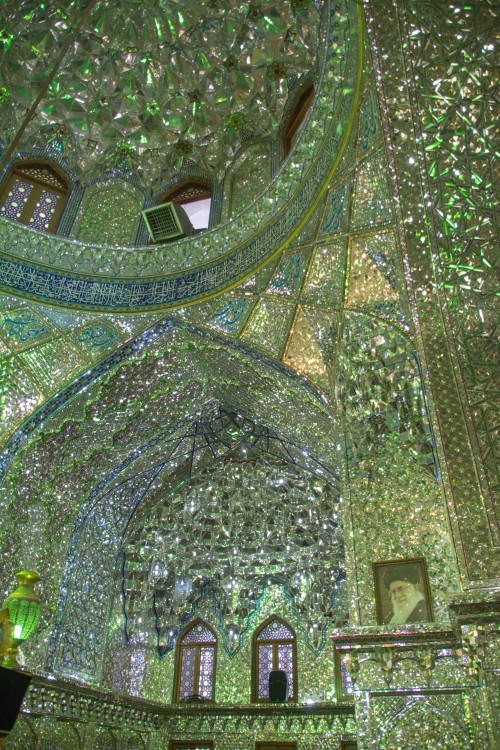 |
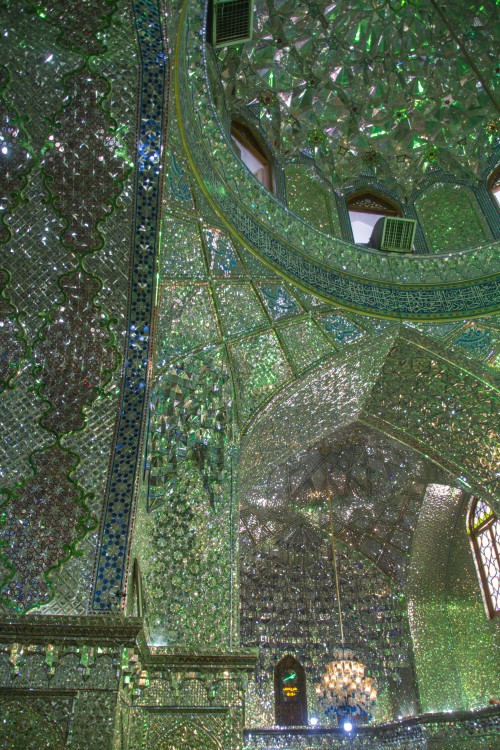 |
 |
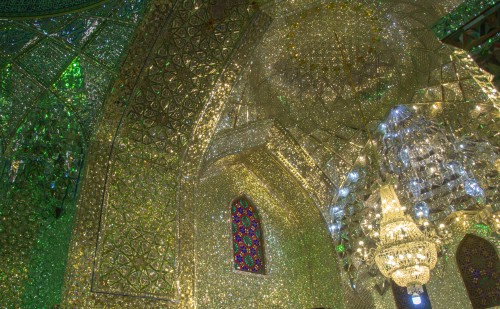 |
Additionally, Justin asked the Imam about what transpires during the decades of teaching religious scholars. He stated there are classes with religious scholars from Judaism, Buddhism, Christianity, etc. At that juncture, Justin asked a loaded question, which was whether religions had more in common with one another, or more differences. The Imam gave an off-the-cuff 15 minute answer, very detailed and well thought out, to which this lowly travel blog cannot do justice. The high level summary was as follows (these are his words, please do not take any of this as "fact," as we don't have 30 years of religious study to know what, if any, of this may be disputed):
At this point, the conversation had been going for about 30-45 minutes, each answer longer than the prior one, and Justin wasn't sure if Amin needed or wanted to get back, so he decided to thank the Imam profusely for the conversation and explanations. One question that he had, but chose not to ask, was how to reconcile the last part of the last answer (about not forcing Islam on others) with living in a country that was religious-based rather than secular. Even if he wasn't worried about the time, Justin probably would have kept that question to himself.
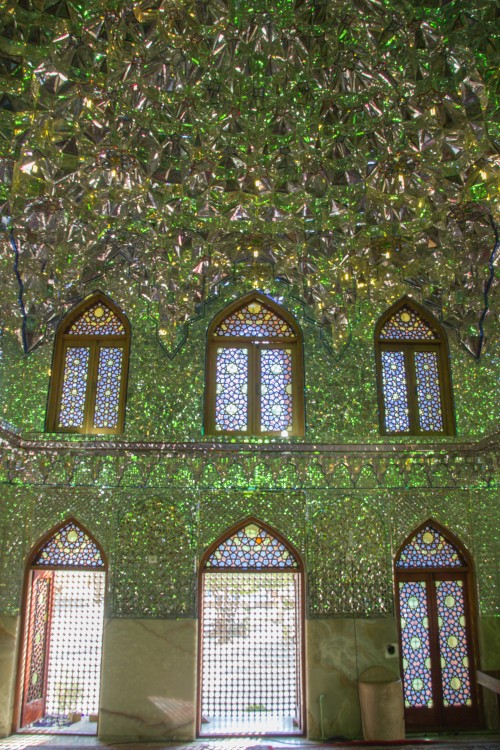 |
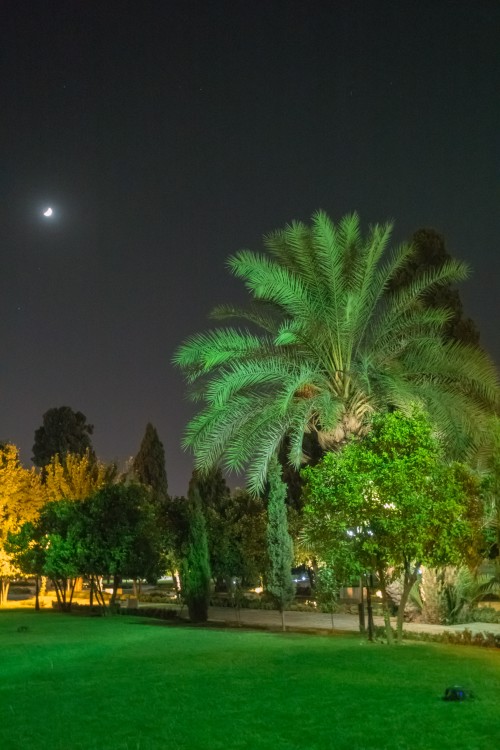 |
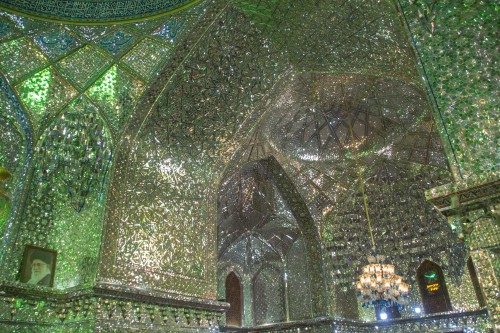 |
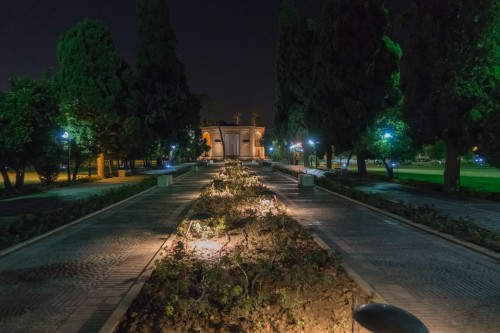 |
Back at the hotel, we both read, and Justin caught up on the diary whilst Crystal took a cat-nap. We weren't hungry, but thought it best that we get dinner tonight, just to help our body clock realize that lunch was not dinner, and that we shouldn't be going to sleep at 8 and waking up at 3:30. We just had to be careful not to get lost, as we had no cell service. But first, we walked across street to Jahan Nama Garden, as it was still open and we hadn't visited there yet. There were a fair number of people there, almost all younger than us. It actually looked like a dating place, as in the shadows we noticed several young women without head scarves. The water from the lawn (which was being watered) made it very comfortable to walk around. After walking around the periphery, we got ice cream at a cafe in the southwest corner. We were given a little bit of grief for saying "Merci" instead of "Derut" (probably have the spelling wrong on that), and saying "Salaam" instead of some other phrase (can't remember exactly what he said). We'd overheard lots of people stating "Salaam" and "Merci," so weren't sure if this guy was being overly protective about something or whether we were actually in the wrong. When we were done, we walked back across the street to the hotel. The street was fairly busy, but nothing too crazy. But when we got across the street, we realized that jaywalking busy streets at night in Iran was probably the best possible way to give our respective moms a heart attack. It seemed very late, but it was only about 8:30. Justin almost made it to 9. Crystal fell asleep shortly thereafter.
| Previous | Index | Next |